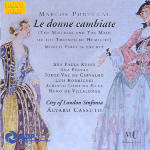Talk about forgotten composers! Marcos Portugal (1762-1830) composed some 50 operas, all of which have disappeared. This present one was premiered in 1797 in Venice but the version recorded is one that was reassembled for Lisbon in 1804. Shorn of what I can only assume were the quasi-endless recitatives that were in style at that time in farces, what we get is 69 minutes of delightful music that makes you want to hear more of this Portuguese composer. Rossini might’ve been pleased with the plot about two women, one a Countess and the other a peddler, who have their identities switched by a playful magician/pilgrim and who wind up better for it (and their husbands) when all is set right. I was afraid that the music would be that flimsy sort of Paisiello interlude stuff, but it’s far more sophisticated: the Countess has some very difficult fiorature to deal with; the ensemble work is complicated; the tenor role is challenging (and our tenor tends to tighten up just when his sound should open up); and the through-composed 15-minute finale is a gem. In fact, the whole work is worth hearing, and if the cast is not exactly world class, it is far more than just respectable, and conductor Alvaro Cassuto leads the energetic City of London Sinfonia (a group founded by the estimable Richard Hickox) with class. Recommended.
































